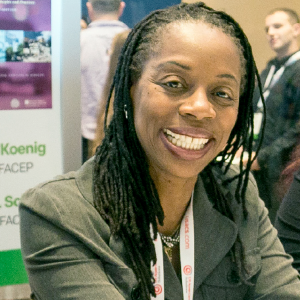Sheryl Heron, MD, MPH, FACEP, knows cognitive bias firsthand—and not just because she’s delivering this year’s James D. Mills, Jr. Memorial Lecture, “Overcoming Cognitive Blind Spots to Improve Outcomes” at 12:30 p.m. on Tuesday, Oct. 31.
Explore This Issue
ACEP17 Preview: Vol 36 – No 09a – September 2017It’s because Dr. Heron, the vice chair of administrative affairs in the Emory University department of emergency medicine, has been blinded herself. Like the time there was an African-American male reportedly found down with a concern for substance abuse.
Dr. Mills assumed from the team’s presentation that, because the patient was homeless, he was inebriated to the point of unconsciousness. In reality, the man was slated to sing for President Obama the next day at the White House and, in his excitement, mistakenly took too much Seroquel thinking it was blood pressure medication.
“Cognitive load takes a toll when moving quickly in a busy ER,” said Dr. Heron. “All of us, I am sure, have made judgments about our patients—and perhaps each other—that have been totally incorrect. The more we give room to the fact that we will make those mistakes, the more we are humbled.”

Dr. Heron
Darnell Scott
Cognitive biases subconsciously affect behavior and can ultimately impact the delivery of care. Bias can be based on race, ethnicity, culture—anything that can be the basis of a judgment.
Dr. Heron said the first step is acknowledging the bias.
“Cognitive bias is not a dirty word,” she said. “It’s not a code word for saying something is wrong with you, that you are a racist or a sexist or any -ism that one may put there. It’s really about pausing to stop and reflect and think, ‘Are my behaviors conducive to and in alignment with either a working environment or a patient encounter that is respectful and would optimize outcomes?’ ”
Dr. Heron will highlight the P.A.U.S.E. technique from Cook Ross to mitigate bias, which encourages physicians and others to:
- Pay attention
- Acknowledge your reactions
- Understand those reactions/judgments
- Search for constructive solutions
- Execute on that strategy
“I would hope that everyone leaves with something … that will help them feel empowered,” Dr. Heron said. “To understand and appreciate why this matters, and [that] it matters, particularly in this time in history, when we need it the most.”
Richard Quinn is a freelance writer in New Jersey.
Rorrie Lecture
Don’t miss the Colin C. Rorrie, Jr. Lecture ”United We Stand: The Influence of Emergency Physicians on Key Health and Public Policy” at 12:30 p.m. on Monday, Oct. 30.
Pages: 1 2 | Single Page





No Responses to “ACEP17 Mills Lecture to Address Cognitive Bias in Emergency Department Patient Care”